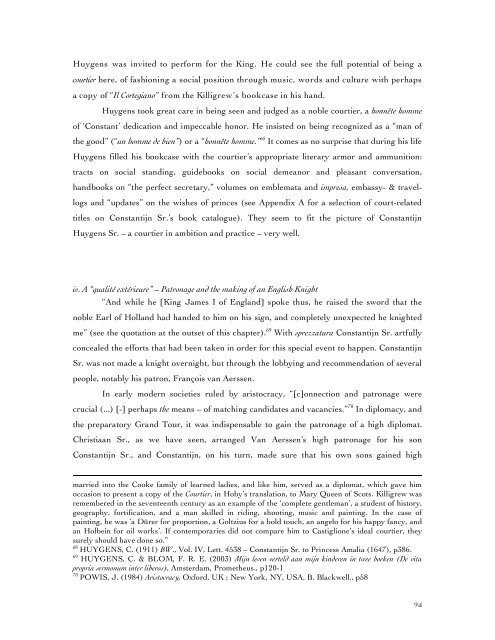Christiaan Huygens – A family affair - Proeven van Vroeger
Christiaan Huygens – A family affair - Proeven van Vroeger
Christiaan Huygens – A family affair - Proeven van Vroeger
Create successful ePaper yourself
Turn your PDF publications into a flip-book with our unique Google optimized e-Paper software.
<strong>Huygens</strong> was invited to perform for the King. He could see the full potential of being a<br />
courtier here, of fashioning a social position through music, words and culture with perhaps<br />
a copy of “Il Cortegiano” from the Killigrew’s bookcase in his hand.<br />
<strong>Huygens</strong> took great care in being seen and judged as a noble courtier, a honnête homme<br />
of ‘Constant’ dedication and impeccable honor. He insisted on being recognized as a “man of<br />
the good” (“un homme de bien”) or a “honnête homme.” 68 It comes as no surprise that during his life<br />
<strong>Huygens</strong> filled his bookcase with the courtier’s appropriate literary armor and ammunition:<br />
tracts on social standing, guidebooks on social demeanor and pleasant conversation,<br />
handbooks on “the perfect secretary,” volumes on emblemata and impresa, embassy- & travel-<br />
logs and “updates” on the wishes of princes (see Appendix A for a selection of court-related<br />
titles on Constantijn Sr.’s book catalogue). They seem to fit the picture of Constantijn<br />
<strong>Huygens</strong> Sr. <strong>–</strong> a courtier in ambition and practice <strong>–</strong> very well.<br />
iv. A “qualité extérieure” <strong>–</strong> Patronage and the making of an English Knight<br />
“And while he [King James I of England] spoke thus, he raised the sword that the<br />
noble Earl of Holland had handed to him on his sign, and completely unexpected he knighted<br />
me” (see the quotation at the outset of this chapter). 69 With sprezzatura Constantijn Sr. artfully<br />
concealed the efforts that had been taken in order for this special event to happen. Constantijn<br />
Sr. was not made a knight overnight, but through the lobbying and recommendation of several<br />
people, notably his patron, François <strong>van</strong> Aerssen.<br />
In early modern societies ruled by aristocracy, “[c]onnection and patronage were<br />
crucial (...) [-] perhaps the means <strong>–</strong> of matching candidates and vacancies.” 70 In diplomacy, and<br />
the preparatory Grand Tour, it was indispensable to gain the patronage of a high diplomat.<br />
<strong>Christiaan</strong> Sr., as we have seen, arranged Van Aerssen’s high patronage for his son<br />
Constantijn Sr., and Constantijn, on his turn, made sure that his own sons gained high<br />
married into the Cooke <strong>family</strong> of learned ladies, and like him, served as a diplomat, which gave him<br />
occasion to present a copy of the Courtier, in Hoby’s translation, to Mary Queen of Scots. Killigrew was<br />
remembered in the seventeenth century as an example of the ‘complete gentleman’, a student of history,<br />
geography, fortification, and a man skilled in riding, shooting, music and painting. In the case of<br />
painting, he was ‘a Dürer for proportion, a Goltzius for a bold touch, an angelo for his happy fancy, and<br />
an Holbein for oil works’. If contemporaries did not compare him to Castiglione’s ideal courtier, they<br />
surely should have done so.”<br />
68 HUYGENS, C. (1911) BW., Vol. IV, Lett. 4538 <strong>–</strong> Constantijn Sr. to Princess Amalia (1647), p386.<br />
69 HUYGENS, C. & BLOM, F. R. E. (2003) Mijn leven verteld aan mijn kinderen in twee boeken (De vita<br />
propria sermonum inter liberos), Amsterdam, Prometheus., p120-1<br />
70 POWIS, J. (1984) Aristocracy, Oxford, UK ; New York, NY, USA, B. Blackwell., p58<br />
24


